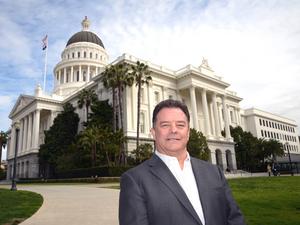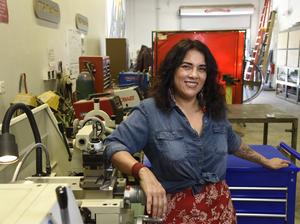In the year of the pandemic, one local industry that didn't slow down was technology.
It's long been part of our region's economic development strategy to offer Sacramento as an extension of the Bay Area and Silicon Valley. It appears that strategy has begun to pay dividends in recent years with companies like fintech startup One, co-founded by a former PayPal CEO, choosing Sacramento as its headquarters.
At the same time, Wall Street seems to have discovered Sacramento, with home-grown tech leaders PowerSchool and Origin Materials preparing to go public at valuations in the hundreds of millions.
This year, for the Business Journal's annual Tech Edge special report, we're presenting a handful of companies and individuals who are among the leaders of Sacramento's tech scene. It's by no means exhaustive, but it represents an important sampling of the names you should know to be aware of where an increasingly vital industry in Sacramento is going.
Companies to know
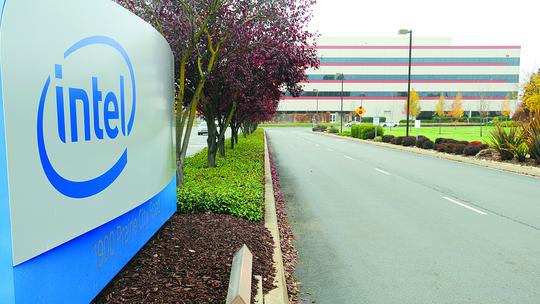
Intel Corp.
Semiconductors
Founded:1968
Headquarters: Santa Clara
Employees:110,600 (local: 6,200)
Investors: Public (Nasdaq: INTC)
Intel Corp. has had a major presence in Folsom and the region since it started developing its campus there in 1983. The campus now includes 1.5 million square feet of office space.
There is no large-scale manufacturing in Folsom; rather, it's a research and development campus that also has sales and marketing functions. The Folsom campus is the largest technology company in the Sacramento region, and its fourth-largest private sector employer overall, behind Sutter Health, Kaiser Permanente and Dignity Health.
Over the years, teams at the Folsom campus have developed microprocessors, chipsets around microprocessors, flash memory, new memory technology and data center mass storage technology. Folsom groups also have worked on technology for virtual reality, drones, robots and artificial intelligence.
Intel veterans and former business partners have founded and held key positions in local companies including Blaize Inc., SynapSense, Apeiron, Anvaya Solutions and VSP Global, as well as venture capital firms Moneta Ventures and American River Ventures.
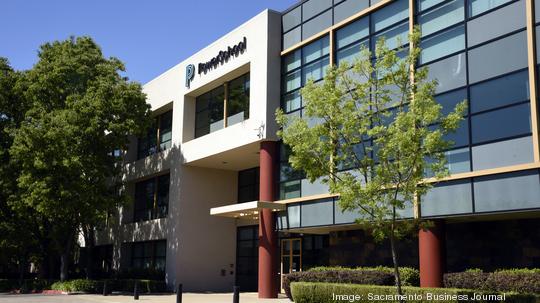
PowerSchool
Software
Founded: 1997
Headquarters: Folsom
CEO: Hardeep Gulati
Employees: 2,600 (local: 440)
Investors: Austin-based private equity firm Vista Equity Partners and Toronto investment firm Onex Corp.
Education software technology company PowerSchool is poised for an initial public offering this spring, with its shares to be listed on the New York Stock Exchange.
The Folsom-based company has expanded its services to school districts through 12 acquisitions since 2016, and now offers K-12 schools and universities software to operate, manage and track everything from admissions, attendance and homework to offering online platforms, student counseling, career counseling and teacher support.
When it goes public, it will trade under the ticker symbol “PWSC.” With public markets backing, the IPO could offer PowerSchool currency to continue to make acquisitions.
The pandemic accelerated the company’s efforts to get more schools and students online. The company’s Schoology platform had just over 2 million students online at the onset of the pandemic. It now has more than 15 million.
PowerSchool says it supports over 45 million students and some 12,000 districts, schools and other education institutions in more than 90 countries.
The company employs more than 2,600 people across the U.S., and has several hundred employees at its Folsom headquarters, though they have been working remotely over the past year.
In its registration statement with the Securities and Exchange Commission, PowerSchool reported annual recurring revenue of $426.9 million at the end of 2020, up from $371.7 million the year earlier. The company is still developing more technological tools to support schools, administrators, teachers, students and parents, said CEO Hardeep Gulati, and it has the ability to cross-sell more of its tools to existing customers and new ones.
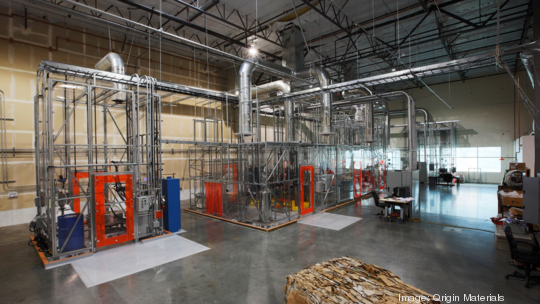
Origin Materials Inc.
Clean Tech
Founded: 2008
Headquarters: West Sacramento
Co-CEOs: John Bissell and Rich Riley
Investors: Nestle SA, Danone SA and PepsiCo Inc. and Mitsubishi Gas Chemical Co. Inc.
Origin Materials Inc., which is poised to become a publicly traded company, has developed a wood-based alternative to petroleum in making PET plastic, which is the recyclable plastic used in everything from beverage containers, packaging, carpets, fiber and even asphalt.
The largest investors in the company over the years have also been its potential future customers, including Nestle SA, Danone SA , PepsiCo Inc. and Mitsubishi Gas Chemical Co. Inc.
Corporate interest in Origin Materials' non-petroleum technology has been growing in recent years as companies look for ways to decarbonize, either for regulatory or corporate reasons.
Origin is now in the midst of going public in a merger with Artius Acquisition Inc. In a filing with the SEC, Artius estimated the transaction could be worth $990.7 million.
New York-based Artius is a special purpose acquisition company, or SPAC, formed last year to make investments in promising technology companies. SPACs, which are sometimes referred to as blank-check companies, have no specific business plans or purpose other than to pursue mergers or acquisitions. Origin Materials co-founder and co-CEOs John Bissell and Rich Riley will continue in their same roles following the merger.
Origin will use the money that Artius will bring in the merger to build its first large-scale manufacturing plant in the Canadian province of Ontario this year, to be followed by a larger commercial-scale facility in 2025. The manufacturing will be located near easily accessible wood products. The company is also interested in redeveloping defunct or marginally profitable pulp mills, because Origin can tap the existing supply chains to those mills, and potentially even the workforce. The large plant likely will be in the Southeast or Northeast United States for access to timber, Bissell said. California has a lot of timber, but it’s not easily accessed.
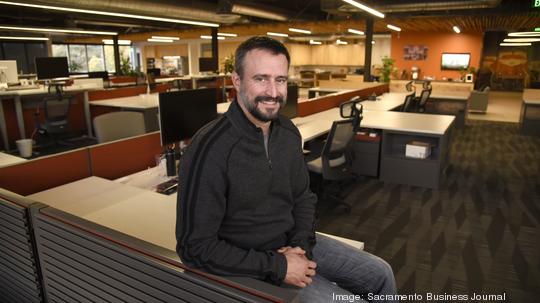
One
Fintech
Founded: 2019
Headquarters: Sacramento
CEO: Brian Hamilton
Employees: 60
Investors: Foundation Capital, Core Innovation Capital and Obvious Ventures
One (formerly One Finance Inc.) was designed as an online-only bank account for the middle class that helps people build savings.
The company launched its product in a beta test about a year ago, and it went to market with its bank account last fall. So far, it has “hundreds of thousands of users and hundreds of millions of dollars in deposits,” said CEO Brian Hamilton. He declined to disclose specific figures.
“We do more for you than putting a pretty interface on a traditional bank account,” he said.
The company targets middle-class customers with a platform that offers basic bank services online without charging high fees. It can be accessed via computer or smartphone. One doesn’t have any branches, which reduces its costs.
The company has grown its customer base largely by word of mouth, but it will start rolling out more marketing this year, Hamilton said. The hallmarks of the services are that there are no account minimums, no overdraft fees and no cash-advance fees if the balance is paid off by the next cycle. People who carry a balance pay 12%, which is less than it typically costs to carry a balance on a credit card.
One has also built its bank account around what it calls "pockets." The pockets are like separate accounts, but they are all linked through the same account. Users can create pockets to spend, save or share money. The "share" pocket allows people who don’t have joint accounts to pay a single bill, for situations like roommates paying rent, or friends splitting a bill at a restaurant.
One also helps users save with pockets. It allows users to automatically divert a percentage of their direct-deposited paycheck into a save pocket, which pays interest ranging from 1% to 3% on new money flowing into the account. Users can’t transfer other money into the interest account.
Hamilton is the former CEO of digital bank Azlo and a former Capital One executive. The company's other co-founder is former Intuit and PayPal CEO Bill Harris.

Blaize Inc.
Information Technology
Founded: 2010
Headquarters: El Dorado Hills
CEO: Dinakar Munagala
Employees: 300 (approximately 30 local)
Investors: Samsung Catalyst Fund, Diamler AG, Temasek, Denso Corp.
Blaize Inc. is developing chips and software that bring connectivity and speed to the edge of networks.
If the Internet of Things is controlled by centralized data centers, then the smart devices at the end of those networks need to be able to operate and communicate faster.
Blaize has developed its “Graph Streaming Processor” architecture, which it says is the first to allow simultaneous neural networks and workflows on a single system. What that means is more speed and complexity of processing with lower latency and less use of electricity. That allows for uses in autonomous vehicles or applications where localized reactions can be necessary in milliseconds — even at the end of a distributed network.
In addition to its software and hardware, Blaize has developed an AI Studio and Picasso Software Development Platforms, which allow customers to implement applications without having to write computer code. That makes its chips’ power and speed available to more users beyond traditional software developers.
Blaize has more than 300 employees with teams in Campbell and Cary, North Carolina. It has subsidiaries in India, the Philippines, and the cities of Leeds and Kings Langley in England.

Unfold
Ag-tech
Founded: 2020
Headquarters: Davis
CEO: John Purcell
Employees: 10
Investors: Bayer AG and Temasek
Vertical farming seed technology startup Unfold is developing strains of popular vegetables that can be grown indoors under controlled conditions anywhere in the world. The technology is seen as a way to bypass seasonal growing restrictions as well as global distribution and supply chain problems. Produce can be grown year-round where the demand is.
The company is developing intellectual property around the seed traits and also software around the techniques and methods of growing plants vertically under artificial light.
“I like to say it’s the Salinas Valley meets Silicon Valley,” CEO John Purcell said. “We are going to make some great advancements on the quality side.”
Last August, Bayer AG and Temasek led a $30 million startup financing round into Unfold.
Unfold is starting with lettuce, spinach, peppers, tomatoes and cucumbers because they are in demand throughout much of the world, Purcell said.
Unfold has 10 employees. It should have about 25 by the end of this year, Purcell said. Last month, the company took 12,000 square feet in a building at 607 Pena Drive in Davis where it will develop its seed traits and techniques.
Unfold is less of a startup and more like a spinoff from its partners, German-based seed and chemical giant Bayer and Singapore-based investment company Temasek. In addition to its investment, Bayer granted Unfold rights to seed genetics from its vegetable portfolio. Unfold is now performing trials and tests on those seed strains to determine which work best for vertical farming. The company will move into its own breeding program later this year, Purcell said. Unfold is also in talks with the University of California Davis to work in partnership with the research university.
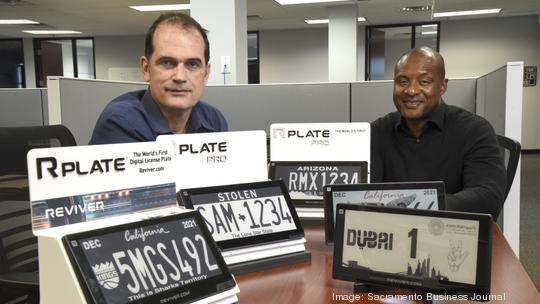
ReviverMX Inc.
Emerging Tech
Founded: 2009
CEO: Bob Wood
Headquarters: Granite Bay
Employees: 54
Investors: Walden Riverwood Ventures, ACK Group
Digital license plate company ReviverMX Inc. is seeing a major sales increase by signing up car dealers all over the state who install its plates on new cars.
In addition to being a sleek-looking license, the "Rplates" include functions such as automatically paying annual vehicle registration, custom messages for private vehicles and posting a warning if the car is stolen. Reviver's Rplate Pro includes a variety of geotracking, geofencing and mileage and speed metric features that can help commercial fleet operators track their vehicles.
The 12-year-old company had sold about 4,000 of its Rplates by October of last year, when it signed up its first car dealership. With a growing roster of auto dealers offering the plates, the company has sold a total of 10,000 plates through May, and it should be on track to pass 100,0000 sales by the end of this year, said CEO Bob Wood.
Reviver is now selling between 2,000 and 4,000 Rplates a month through a network of 23 dealerships. The company is getting 20 more dealerships ready to launch, and it has agreements with another 56 in California. It has some level of interest from another 217 auto and truck dealerships. The company is next looking to get its plates integrated with motor vehicle departments in Arizona, Texas and Illinois.
The company is also working with universities to offer Rplates as an affinity opportunity for alumni, Wood said.
Reviver is adding features that allow the license plates, through an encrypted app, to pay bridge fast-pass tolls, tell the user where the car is parked and tell the owner whether anyone has driven the car, said founder Neville Boston.
The Rplate costs $499 or a monthly subscription of $17.95 and the Rplate Pro costs $599 or $21.95 per month.
Connectors
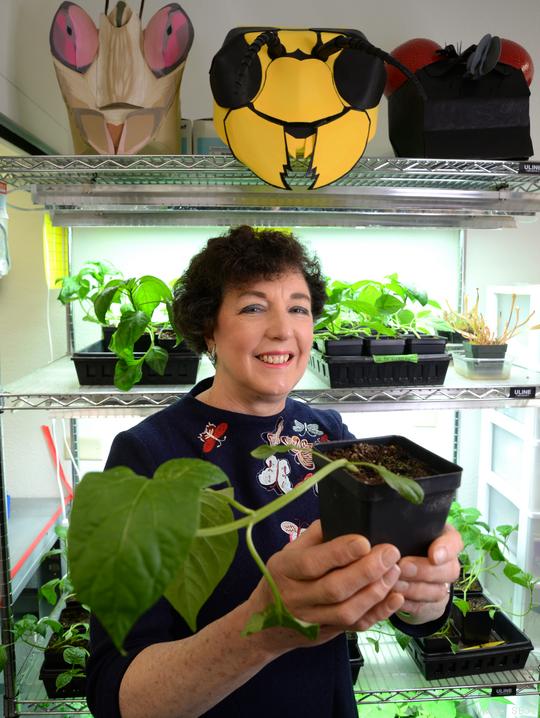
Marrone founded three companies in Davis that developed technology and products that use biological sourced materials to replace chemicals in pest control and nutrition in agriculture, the most recent of which is Marrone Bio Innovations Inc.
Marrone retired as CEO of the company last year, but she’s still on its board of directors and working as a consultant. She is now mentoring a handful of life-sciences technology startup companies, and serving on the board of AgStart, a Woodland-based nonprofit business incubator program for ag and food innovation companies.
In 1990, Marrone started a biotech subsidiary for Danish chemical company Novo Nordisk. Then, in 1995, she launched her own startup biologics company, AgraQuest. It developed and brought to market the fungicide Serenade, among other products. German chemical giant Bayer bought AgraQuest for $500 million in 2012. Marrone launched her third company, Marrone Bio, which she named after her father, in 2006, and it went public in 2013.
Marrone is currently executive chairwoman of biologics sales platform Primary BioAg Innovations in Utah and managing director of precision ag tech at consulting firm Global BioAg Linkages. She also consults and works with several companies with women co-founders in the ag-tech industry.
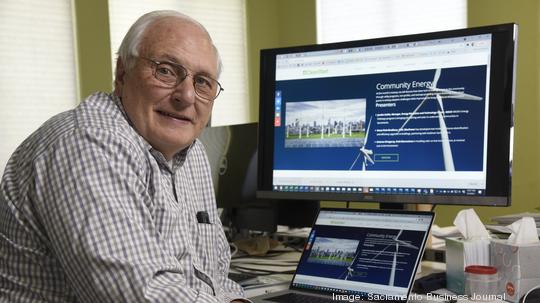
Simon retired in 2002 after a more than 30-year career in the energy business, but he never stopped working in the sector.
He is currently chairman of CleanStart, a nonprofit he launched in 2003 out of the Sacramento Area Regional Technology Alliance. The alliance, also known as SARTA, disbanded in 2015, but Simon has kept CleanStart going. The organization connects the region's clean technology sector and offers advice on financing and grants available to clean-tech startups. The nonprofit also hosts panel discussions with entrepreneurs and veterans in the industry.
In the late 1970s, Simon was head of the forecasting and planning division with the California Energy Commission. He later worked as a private consultant and then as director of California affairs with El Paso Natural Gas. In the 1980s and '90s, Simon was a senior director with the energy consulting firm Cambridge Energy Research Associates. At Massachusetts-based Cambridge, Simon was senior vice president of strategy and development for Northeast utilities.
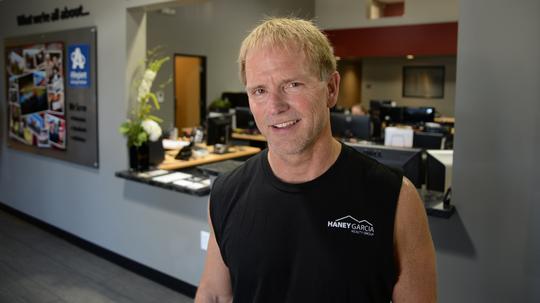
Haney is the founder and CEO of Rocklin-based Haney Business Ventures, which offers services for entrepreneurs and startups, including digital and broadcast media production, programs and event spaces. He grew up in south Placer County, and has said he wants to help the region thrive by facilitating the growth of local companies.
To that end, he has put on panel events, investor events and hosts a podcast where he talks with entrepreneurs about their businesses, the challenges they face and how they overcome them.
Haney also invests in startup companies.
Before the pandemic, he presented a four-time-per-year event called Entrepreneurs Unleashed, which hosted panel discussions with people experienced with starting and growing businesses. He also supported entrepreneur pitch sessions where local companies expose their business plans and ideas to investors.
Haney made his own fortune by launching, growing and selling several video security companies over the years, including Northern Video Systems Inc. and Tri-Northern Security Distribution Inc., both to Dallas-based private equity company Brazos Private Equity Partners LLC in 2010. He's still involved in Surveillance Systems Integration Inc., which makes video surveillance systems for casinos. He's also a founder or co-founder of at least eight other companies, and he’s working on raising a fund to invest in local seed-stage startups.

